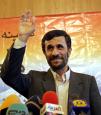IRAN; MYTHS & REALITIES
“Iranian Women”
Whatever other qualities Iran’s new president may possess, reticence is not among them. Since taking office in June Mahmoud Ahmadinejad has rebuked moderates and enthralled supporters by expanding Iran’s nuclear “energy” program, banning western music on state media, and waging class warfare against local “malefactors of wealth”. He has ratcheted up tensions with Israel, first calling for the destruction, of “the zionist entity” , and then modifying that demand to one for “moving” the Jews to Western Europe. He has increased spending on the poor in defiance of IMF dictates and has followed through on an election promise to turn cultural sites back into mosques.

Mr Ahmadinejad’s latest public imbroglio is a deusey. Last week, he was quoted as saying that the “legend of the Holocaust” had been used by Jews and westerners to dispossess the Palestinians. This was quickly and widely (mis)translated into a claim that the Holocaust itself was a “myth”. Whatever was meant by his remarks, condemnation was immediate and near universal, with some states calling for Iran’s expulsion from the UN.
The howls of disapproval continue to echo throughout Iran’s diplomatic missions. Even Russia and most of Asia, including China, which hopes to do energy business with Iran, have privately told the Iranians that they’ve gone too far, though China, especially, has kept shut in public.
The controversies have eclipsed larger questions about what, exactly, Mahmoud Ahmadinejad is up to. A former intelligence officer, university professor and mayor of Tehran, is he the fundamentalist ignoramus famously pictured in western media? Or, is the west once again famously over-reacting?
Mahmoud Ahmadinejad won a hotly contested election last June against a “moderate” opponent who had been calling for the normalization of ties to the West. Unfortunately for the reformers, Hashemi Rafsanjani was popularly seen as indifferent to the needs of the poor, which comprise the overwhelming majority of Iranians. Mahmoud ran as a self-deprecating alternative who would better the lot of the impoverished, wipe out corruption, and rule Iran as a force to be reckoned with. He won in a runoff with more than 62% of the vote. In his victory speech, the new president promised to make Iran a “modern, advanced and Islamic role for the world”, while raising living standards for the indigent and putting “corruption” and “western decadence” on notice.
Mahmoud Ahmadlinejad’s election was greeted with gloom by governments throughout the west. Of the new president’s background, little was known. Early rumors of involvement in the 1979 seizure of the American embassy in Tehran were later proved false. It is now known that Ahmadlinejad worked for Iran’s intelligence servies during the 1980s and that his background suggests that a compromise with the West should not be ruled out.
Mahmoud, it is clear, is neither all mouthy fanatic or principled anti-imperialist, but a devout and self-abnegating muslim nationalist combining elements of the two. His aim is to get a better deal for Iran as a regional power, rather than steer it toward a potentially catastrophic showdown with Israel or the west. He wants at least as much from the west as it wants from him. Maintaining agreeable regimes in the islamic world has always been a dangerous and expensive business for the imperialist powers and now, as in the past, delicate and creative bargaining will see off the present crisis.
Indeed, what is emerging from the past six months of Iranian history is something like a re-figuring of the ambitions of the old Persian empire, seeking as in the past historic alliances to the east as well as with the west, while positioning itself as a power to be reckoned with. In neighboring Iraq, it has been reaching out to the lackey regime (which Iran views as ephemeral, but important enough to court the ethnic and religious elements contained within it). Mahmoud Ahmadinejad knows that with Saddam in irons, the active leadership of the “anti-zionist” camp will naturally fall to him. The trick for him is to use that as an organizing force for islamic unity (with Iran as its titular head) without going so far as to provoke an attack from Israel or the United States.
Of course, Mahmoud will not be the first to lead his country from the “frying pan” of globalization into the “fire” of nationalism. No matter what happens, the poor and workers of Iran have very little to gain from any of the major actors currently on stage in Tehran.
Nonetheless, the new president sees his country as a “model” for the Islamic world–powerful, independent, and “advanced”, yet flexible enough to profitably exploit the vagaries of modern international politics. Despite the rhetoric, Mahmoud Ahmadinejad truly wants to engage the West in the tradition of past islamic regimes, but on terms that take into account Iran as a growing regional power. Whether that will translate into a better life for Iran’s poor has been answered in other contexts; sadly, it will not.
